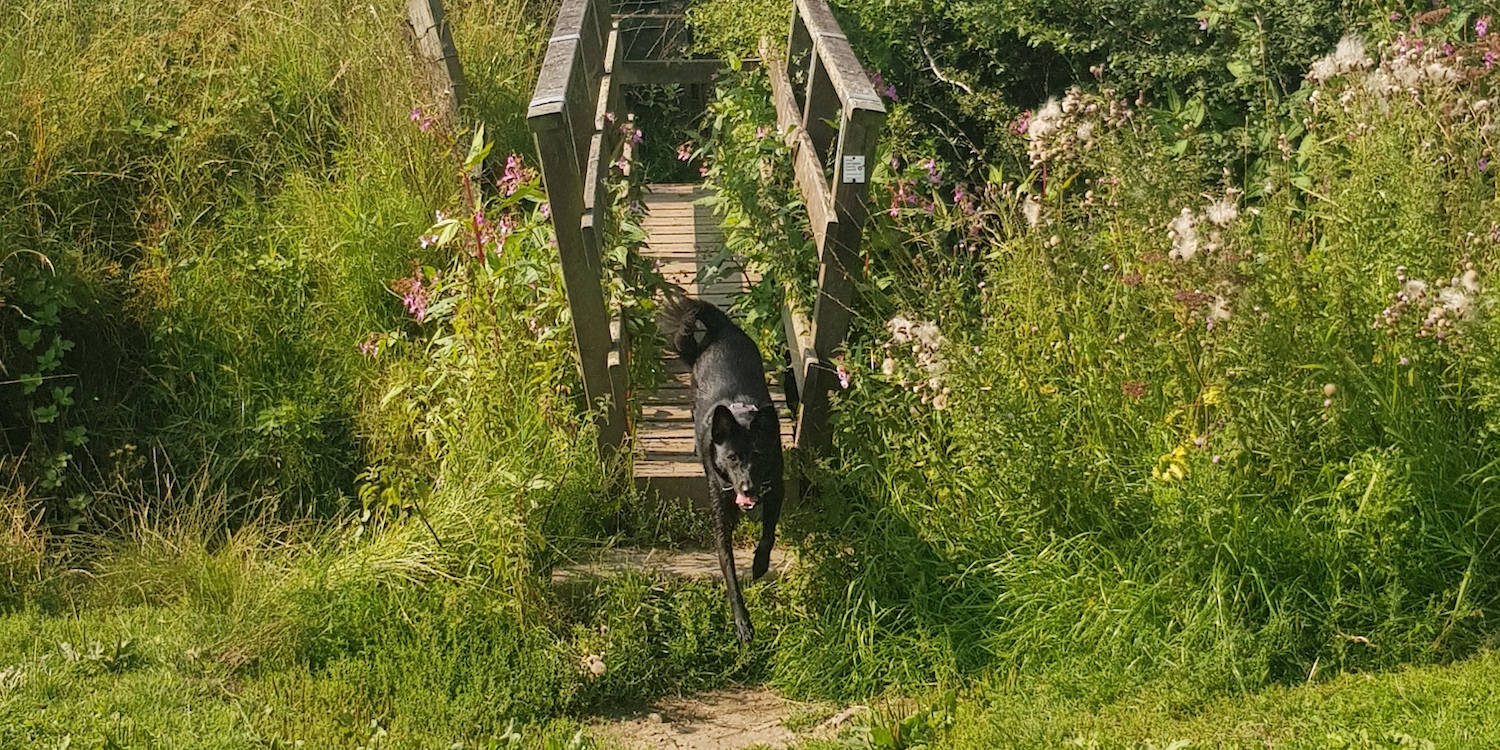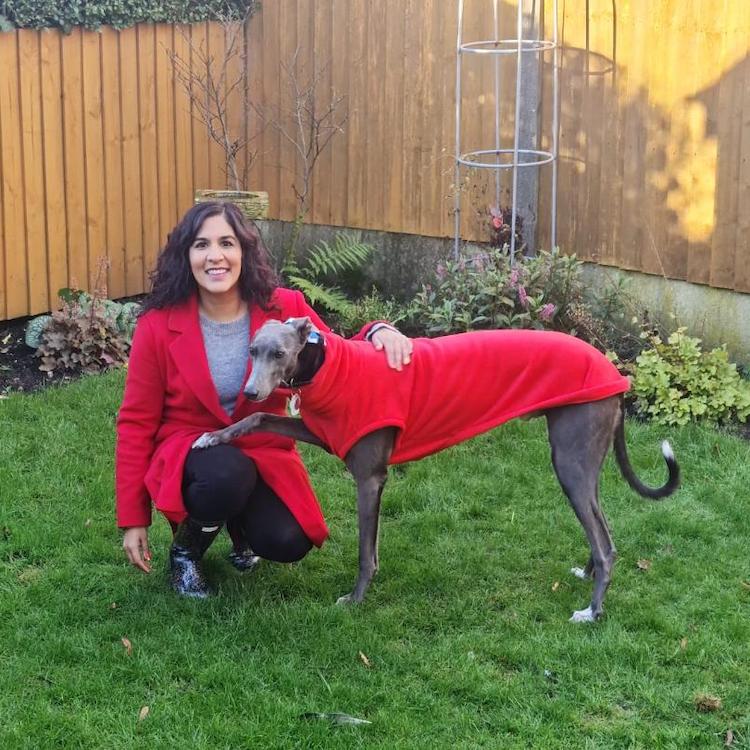
Once upon a time (2018) in a faraway land (South- East London) I jointly rescued a beautiful lurcher from the castle where she was living (Battersea Dogs and Cats Home).
I had waited over 30 years to responsibly adopt a rescue dog, I did everything by the book – including getting flexi-leave from my office job and obtaining permission from my landlord to have a dog in our rented flat. However, I learnt that love and good intentions are not always enough when it comes to adopting a rescue dog. I say this because our story did not have a happily ever after ending, as Gosseta was whisked off into the sunset with the person I had jointly adopted her with.
There is much to be said of rescue dogs. For many dogs who find themselves in rescue, home is often a person, rather than a place.
This is certainly true of my rescue greyhound, Theo. We met, unexpectedly, at the start of lockdown, in April 2020. I was still grieving the loss of Gosseta, and I only planned to foster Theo for 3 months during lockdown. Nearly 2 years later, Theo, who I ended up adopting, is only just leaving me for the home he should have always had.
“Do your research and be honest about your work commitments and lifestyle to ensure you are matched to the right rescue dog.”
Often we choose to foster or adopt a rescue dog with a timeline in mind – perhaps we take 2 weeks off work to help them settle, perhaps we are happy to cancel a few social invitations but then we become frustrated when we are still cancelling months later.
There is so much for you to think about, to plan for, to prepare for, when adopting a rescue dog.
There is tonnes of advice at your fingertips, multiple rehoming charities to choose from, not to mention your own emotions as you begin your search for your rescue dog, and it can feel overwhelming.
It’s always good advice to start at the beginning. Before you even search for your nearest rehoming charity, the first thing to ask yourself is: what kind of rescue dog are you looking to adopt? No, I don’t mean your preference for a hypoallergenic dog that doesn’t moult, fits on your lap, is well behaved around your children/family/friends and is easily trainable (that’s a tall order for any dog!) I mean what kind of rescue dog are you prepared to bring into your home?
How would you cope if you rehomed an ex-street dog from Romania? A dog that possibly has learnt some seriously impressive survival mechanisms, distrusts most humans and is a prolific scavenger? Would you know how to rehabilitate an ex-hunting dog from the streets of Spain? Or would you be calling the charity to take him/her back the second that the dog’s natural instincts took over?
Dogs end up in rescues for a variety of reasons, and no two rescue dogs are the same. For this reason, please don’t be tempted to adopt based on a cute profile photo, do your research and be honest about your work commitments and lifestyle to ensure you are matched to the right rescue dog.
I am often asked... can a rescue dog be trained?
In a nutshell, yes, they can. Both of my rescue dogs have needed training – on everything from toilet training to separation training.
But, before you start worrying about training, ask yourself: are you meeting your rescue dog’s needs? Are you providing warmth, safety, security and comfort? I have helped other owners to train their rescue dogs, but my philosophy is very much relationship first, training second. The relationship you have with your rescue dog will influence how successful your training is.
My top 5 tips when training your rescue dog are:
1. Prioritise your dog’s needs over your own. You might want to start immediately with separation training, but maybe your rescue dog needs a few weeks just to get used to their
new home and all the different sights, sounds and smells. You might want to go on long country walks or for dog-friendly pub lunches, but your rescue dog might not be ready for this.
2. Don’t be tempted or fooled into believing that you need to use harsh punishment-based training methods. You don’t need to be the boss of your dog or punish them to make them behave how you want. You can make great progress using food, treats, toys and other rewards.
3. Train little and often. Keep your training sessions fun and short, be consistent yet relaxed in your approach to training. Don’t forget that your rescue dog is learning all of the time, not just when you are training. Behaviours that get rewarded, get repeated. So don’t be afraid of rewarding your rescue dog whenever they are showing behaviours you want to see more of.

4. Be realistic. If you have adopted an older rescue dog they will need to “unlearn” their previous life before they learn that they are now home and safe with you. My Theo was 5 and a half years old when I fostered him, 20 months later, he is still anxious without another dog for company. This is not a recommendation to get a second dog, it’s a reality check. Training takes as long as it takes, and progress is rarely linear.

5. Ensure you have help at hand. Sometimes adopting a rescue dog can be a lonely process, particularly if they are fearful/reactive towards other dogs, which can be a bit isolating.
Reputable charities should offer you support even after the adoption process has been completed.
How can I help a rescue dog who is scared of everything?
Firstly, stop scaring them. That sounds simple right? Because it is simple. If your dog is scared of being alone, don’t leave them alone. If they are scared of other dogs, don’t walk them in the park or force them to make new dog friends. Unfortunately, when our rescue dogs are scared, we are often led to believe that the “right” thing to do is to force them to get used to the scary thing by exposing them to it every day. Or even worse, we are told “he/she needs to socialise”. Well, let’s say you’re afraid of heights, but every day I bundle you into my car and drive you to the top of a mountain. When we arrive, you are already scared, but you need to get used to it, so I walk you to the edge and make you look at the views. Some days I invite a bunch of my friends to meet you at the top, because you also need socialisation to get over your fear of heights. Do you think you would “get used to it” or would you become even more afraid?
The “he/she needs to get used to it” advice makes absolutely no sense, right?
Fear in rescue dogs is a very real emotion, and contrary to what you might be told over and over again, it is ok to take a break from scary walks if your rescue dog isn’t enjoying them.
How can I help my rescue dog with their separation anxiety?
If your rescue dog suffers from separation anxiety, start by not leaving them home alone. This isn’t the advice you’ll get from Google, or from your neighbours, or your mum’s friend who has had dogs all their life. This is an unpopular recommendation because it can be difficult to implement. But it is the first step to helping a rescue dog with separation anxiety. Don’t leave them alone.
Both of my rescue dogs have suffered from extreme separation anxiety. My first rescue dog, Gosseta, would toilet from the stress of being left alone, and then taught herself to open doors so she could be with us all the time – I kid you not! Theo, my rescue greyhound, is even worse than Gosseta. He also suffers from hypervigilance which means he can’t relax if he thinks someone is about to go out.
Separation anxiety is an umbrella term for lots of different kinds of anxieties. Including barrier frustration (dogs who don’t like to be crated or shut inside a room) or hyper- attachment (dogs who become very distressed if their favourite human leaves the room or goes out without them). Trying to tackle separation anxiety on your own can be a difficult, frustrating and lonely process. Search for a professional trainer who can help – but please ensure their methods are kind and not based on punishing your rescue dog.
These are just some of my tips on training your rescue dog. If you’d like further advice or information, please email me meerapuppins@gmail.com
Our Expert
Meera is the owner of Meera Puppins Puppy Training & Puppy Socialisation in Penwortham, Preston, Lancashire. Meera has personal and professional experience of training and caring for rescue dogs, based on the belief that relationship comes first, training comes second. Meera is a reward-based puppy trainer who promotes ethical training techniques and helps puppy owners to build better bonds with their pups.
Her services include a 5 week Practically Perfect Puppy training package for new and inexperienced owners, as well as proper puppy socialisation – without resorting to doggy daycare or gimmicky group walks.
To book the care your puppy deserves, please contact Meera via her website www.meerapuppins.co.uk or email her meerapuppins@gmail.com
